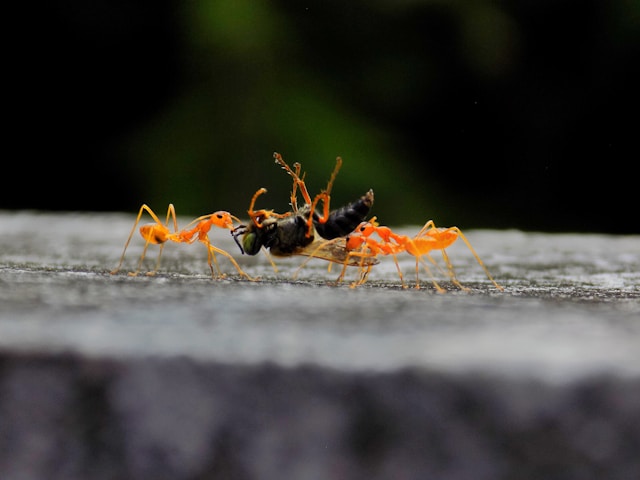Ant infestations are one of the most common household pest problems, and they can be surprisingly difficult to eliminate once they take hold. These pests may seem small and harmless at first, but they are highly organized, persistent, and capable of colonizing both indoor and outdoor spaces quickly. Once a colony has identified a reliable food or moisture source, ants leave pheromone trails that direct others to follow, leading to a steady stream of activity and long-term trouble for homeowners.
Understanding how ant infestations start and what encourages them to stick around is essential to preventing them from becoming a recurring issue. This guide breaks down the biology of infestations, signs of early activity, and strategic prevention measures that align with proven pest control principles.
Why Ants Enter Homes in the First Place
Ants are motivated by basic survival needs: primarily food, water, and shelter. Even the cleanest homes can attract them under the right conditions. The smallest crack in a foundation or the tiniest spill of sugar on a counter can trigger a full-scale invasion within hours.
Reasons ants enter residential spaces include:
- Searching for food: Most ants are attracted to sweets, proteins, or greasy substances. Kitchens, pet bowls, and garbage bins are high-risk zones.
- Seeking moisture: Leaky pipes, wet basements, or potted plant trays create attractive humid conditions, especially during dry seasons.
- Establishing new colonies: When an existing colony becomes too large or threatened, ants will split off and form satellite nests in nearby areas.
- Following seasonal changes: Shifts in weather, especially from warm to cold or wet to dry, often drive ants indoors. Learn more about seasonal pest patterns that may affect ant behavior in your area.
Once inside, ants rely on trails and scouting behavior to recruit others, often leading to visible lines of movement along baseboards, counters, or walls.
Early Signs of an Ant Infestation
Catching an infestation in its early stages gives you the best chance at minimizing damage and controlling the spread. Many homeowners don’t take action until they see large trails of ants, but by then, the colony has often already taken root.
Watch for these early indicators:
- A few stray ants: These scouts are the first sign that a colony may be nearby. If they return or multiply, it signals the location is being targeted.
- Visible trails: Ants communicate via pheromones. If you see a defined path, it means they’ve found something worth sharing with the colony.
- Tiny piles of dirt: Certain species, like pavement ants, leave behind small mounds near entry points or along foundations.
- Sounds inside walls: In severe cases, you might hear rustling in wall voids or near cabinets.
- Inconsistent pest activity: Ants may vanish for days, then return with force, often due to fluctuations in colony size or food availability.
Consistent sightings are a strong indicator that the problem is not just external but already spreading internally.
High-Risk Areas and Entry Points
Ants exploit weaknesses in both the structure of your home and your daily habits. Knowing where they’re most likely to enter and nest is crucial for targeted prevention.
Common areas include:
- Around doors and windows: Cracks in caulking or worn seals make easy access points.
- Kitchen and pantry: Food spills, crumbs, and open containers are magnets for foragers.
- Bathrooms and laundry rooms: These moist environments provide water and warmth.
- Basements and crawlspaces: Dark, damp, and often neglected; ideal conditions for nesting.
- Exterior utility lines: Ants can use cables, plumbing, or tree branches to gain access.
- Garage or storage areas: Clutter and cardboard boxes create nesting opportunities.
These areas should be checked regularly and sealed or cleaned to avoid drawing ants into your living space.
Effective Prevention Strategies
Preventing ant infestations means eliminating what attracts them and making your home a less accessible target. This involves both routine maintenance and structural fortification.
Key strategies include:
- Seal cracks and crevices: Use weather-resistant caulk around doors, windows, and foundation gaps.
- Store food properly: Keep pantry items in airtight containers and clean up spills immediately.
- Fix leaks and reduce moisture: Pay attention to plumbing under sinks, around washers, and in basements.
- Clean frequently: Vacuum, mop, and wipe surfaces regularly, especially in kitchens and dining areas.
- Control outdoor attractants: Keep vegetation trimmed, remove standing water, and avoid stacking firewood near the home.
- Empty trash often: Use sealed containers and clean bins regularly to eliminate odor trails.
For comprehensive prevention, it helps to consider the five layers of pest protection as outlined in modern integrated pest management approaches.
When to Bring in the Experts
There comes a point when routine cleaning and sealing aren’t enough. If ants are reappearing despite your best efforts, or if colonies are hidden behind walls or under flooring, professional support may be necessary.
Consider contacting a pest control specialist if:
- Ant trails persist for more than a few days
- You notice ants in multiple rooms or levels
- Home remedies or bait stations are ineffective
- There are visible nests near the foundation or indoors
- You’re dealing with carpenter ants or other wood-damaging species
Professionals have access to targeted treatment methods and detection tools that homeowners don’t. More importantly, they can build a custom strategy that addresses both current infestations and future prevention without over-reliance on chemicals.
Show Ants the Exit For Good
Don’t wait for ants to settle in. If prevention measures haven’t worked or you’re unsure how extensive the problem is, reach out to Ecoline Pest Control for a smart, long-term solution tailored to your home.
 Reviews
Reviews





